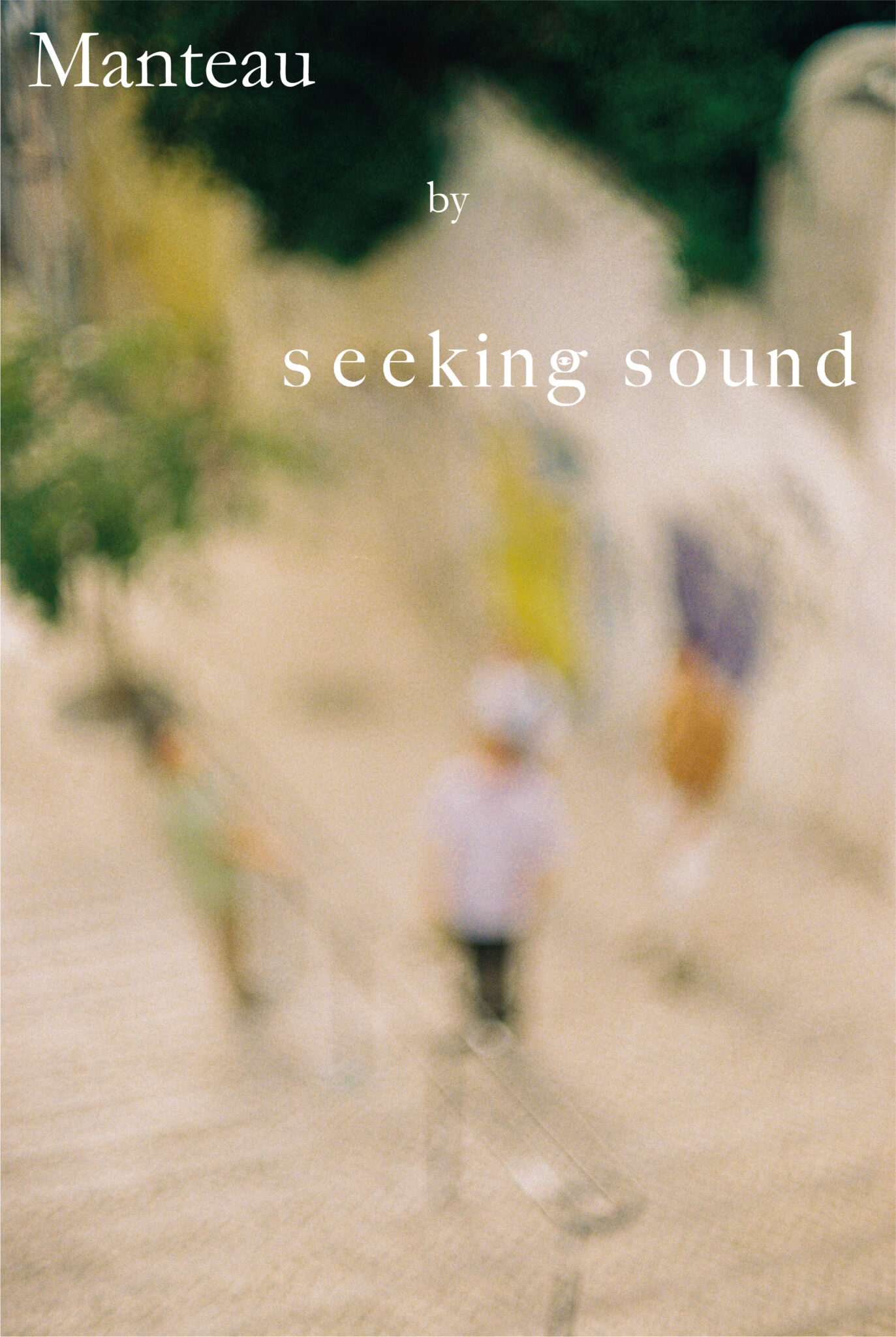“When you’re surfing, you’re not thinking, you’re simply present, without worrying or rambling.”
Published on the 1st of July, 2023
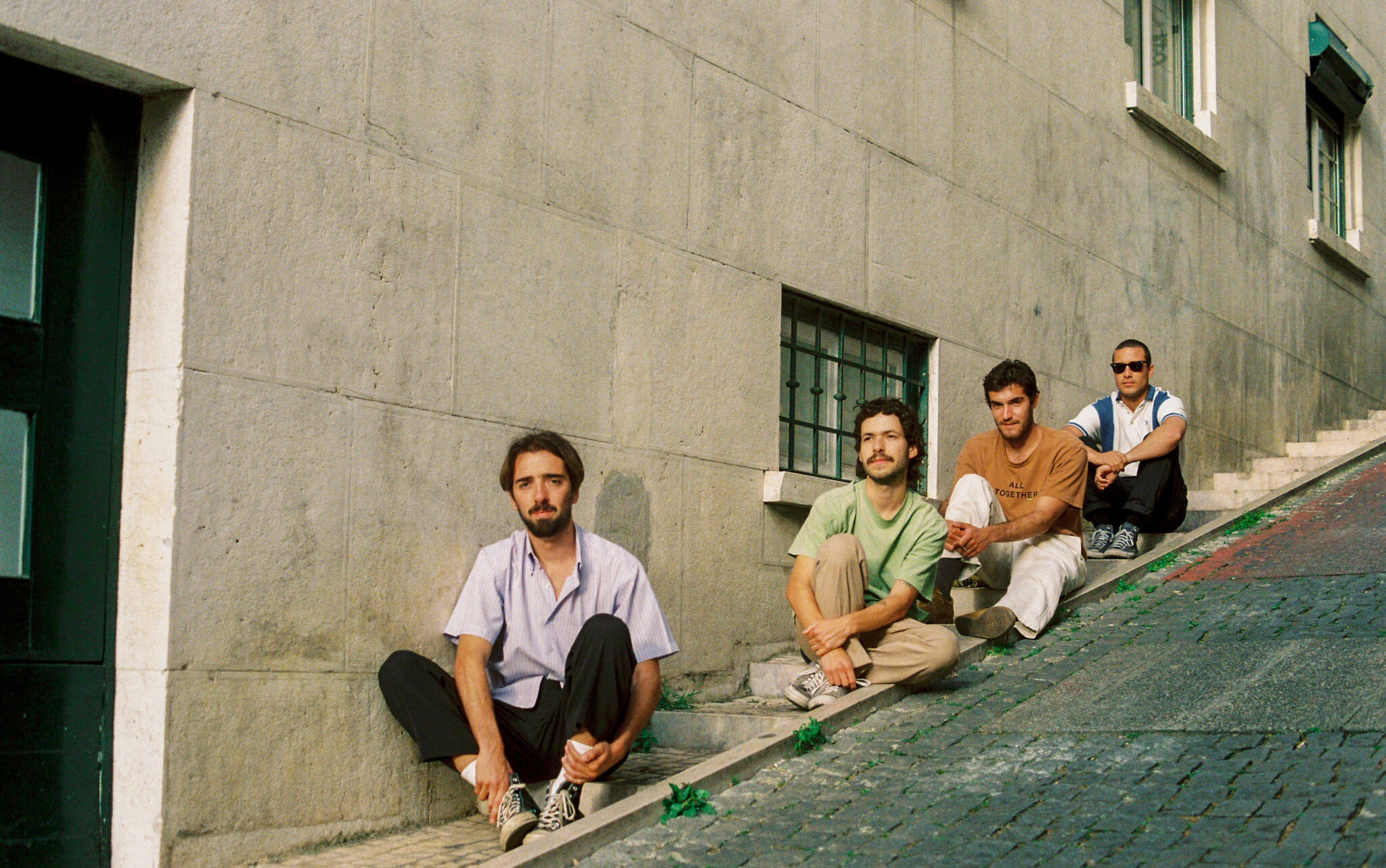
António Jordão, Janito (João Carriço) , Zé Salgado, and João Girbal from left to right.
Manteau, more than a band, represents a lifestyle, a connection, and a motto. Their music is fantastic. Despite having a splash of nostalgia and sadness, their songs are always accompanied by the underlying feeling that everything is going to be alright. Manteau have already released two EPs: Timequake (2022), and Farsa (2023), which were wonderfully produced by Gonçalo Bicudo. These put them on the radar, as one of the most interesting emergent Portuguese bands of the current times.
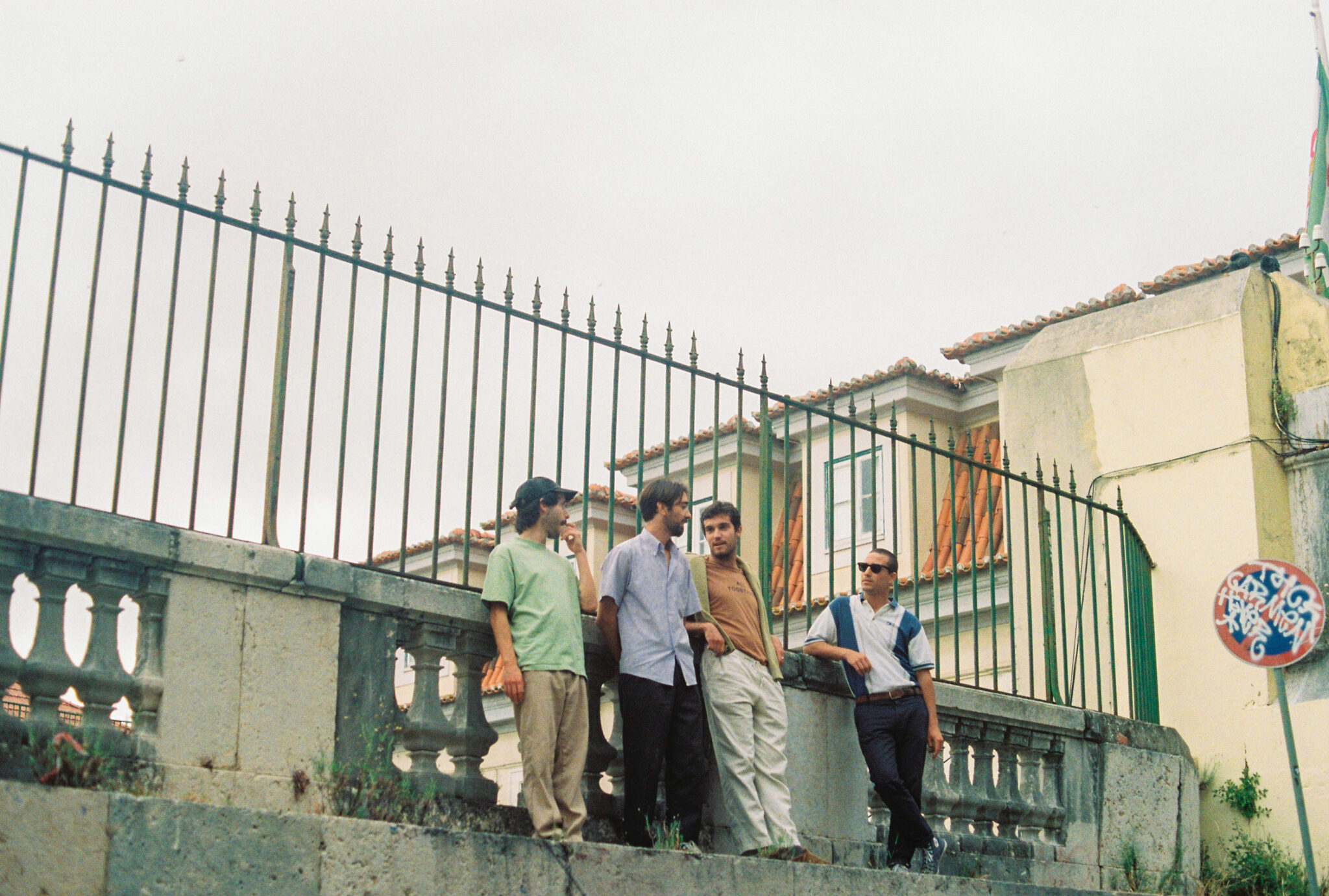
On the 29th of April, we were very well received by Manteau in their studio, where we chatted about life, balance, friendship, energy, and respect. Then we went for a walk through the streets of Lisbon, which have influenced these four so much. Nothing comes from nothing. There’s a lot of work, effort, sweat, and tears behind this special and unique sound that Manteau have. By telling their story, they are, in a way, telling the story of all human beings. At the end of the day, everything makes sense.
We recommend you have Manteau’s Spotify open by your side while reading the interview so that you can listen to any of the songs mentioned if wanted.
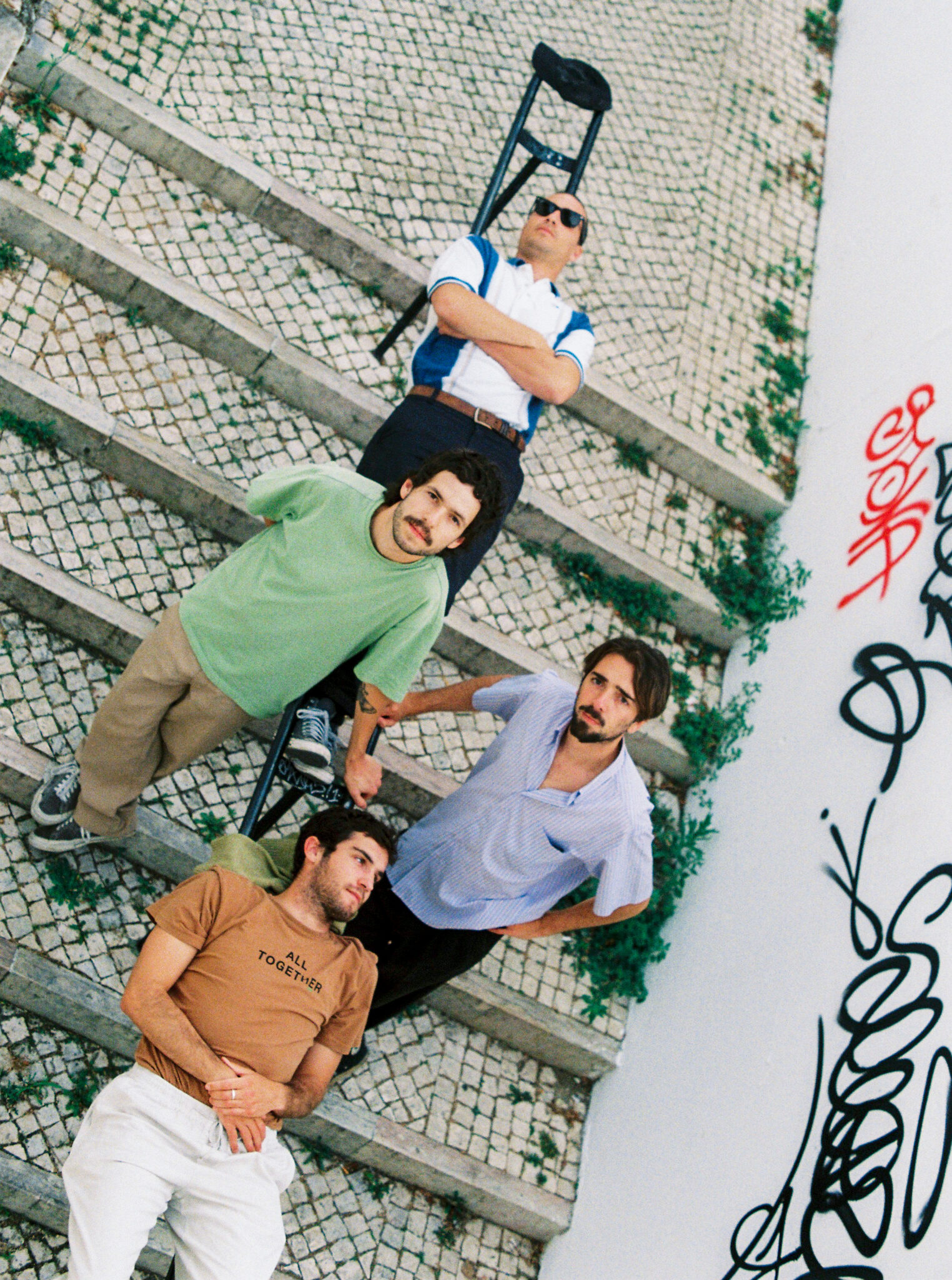
Hi guys. You met in 2020 and soon after formed the band. How did COVID influence your first months of music creation and rehearsals?
João Girbal: Zé was living by himself in Portugal because his parents live in Switzerland. António and I spent many weeks at Zé’s house, whom we had just met. We took instruments with us and spent days playing and singing together. In the early days of the band, we just improvised and created.
That phase was important because as we had nothing to do, we spent a lot of time together. It was during those months that we started to deepen our connection and play a lot more. Eventually, we got together with our first drummer and friend, João Carvalho, and had a very special first rehearsal at Nirvana Studios. Our first live appearance was a Jam opening, where we played four of our own songs, and one cover, and even improvised a bit.
Janito, you were a recent addition to the band when the need to find another drummer arose. How did you guys come across each other?
João Girbal: Last year, due to scheduling complications, as João plays drums in different musical projects, at a time when we had many concerts scheduled, we were forced to try to find another drummer to play with us. I vaguely remembered that a friend of ours, João Fragoso, had introduced us to Janito in a concert we did in Cosmos. We immediately got Janito’s contact and invited him to come and rehearse with us. nd
Janito: Fragoso asked me if I wanted to go and see that concert at Cosmos, and it was one of those things that in retrospect, I might as well not have gone to. So, readers, get out of the house when you’re invited to something, even if it doesn’t interest you. You never know what might come up.


You released your 1st EP Timequake with the following statement: “We hope you enjoy our first work together. These four songs kickstarted our friendship and allowed us to play live – and that was always the point”. Was it difficult to find your sound as Manteau?
João Girbal: We are still finding it. As we didn’t have a very big portfolio, we chose to make an EP, because we felt that we were looking for our sound, what we wanted to play, where we fit in, and how the four of us could best combine. And we continue to do that search and I hope it will always be like that, because we can’t, nor do we want to define the Manteau sound as something specific. The four of us come from completely different musical backgrounds and each one has his own language. So, each one of us has been giving his input, to build a joint language. Each one of us is pulling a little bit towards his side and we find ourselves in a common point that, until now, has been the Manteau sound, which will naturally change.
“Neme Tangito” and “Always The Point” are original songs of yours that you have played at your concerts but have not released yet. How do you choose what gets released and what stays in the drawer?
António Jordão: There are songs that when we hear the initial recording, which we usually do with a phone, we decide not to pick them up. Sometimes there are songs that we pick up and work on, but after two weeks, we’ve already forgotten them. Some songs are still played at jams, or some gigs. “Neme Tangito” was played two or three times live and then it started not making sense, there were doubts and we “forgot” it. “Always The Point” was recorded to be part of Farsa, but we thought it wasn’t ready yet. If the song survives, it gets worked on and eventually recorded, but when it doesn’t, it gets lost in the ether.
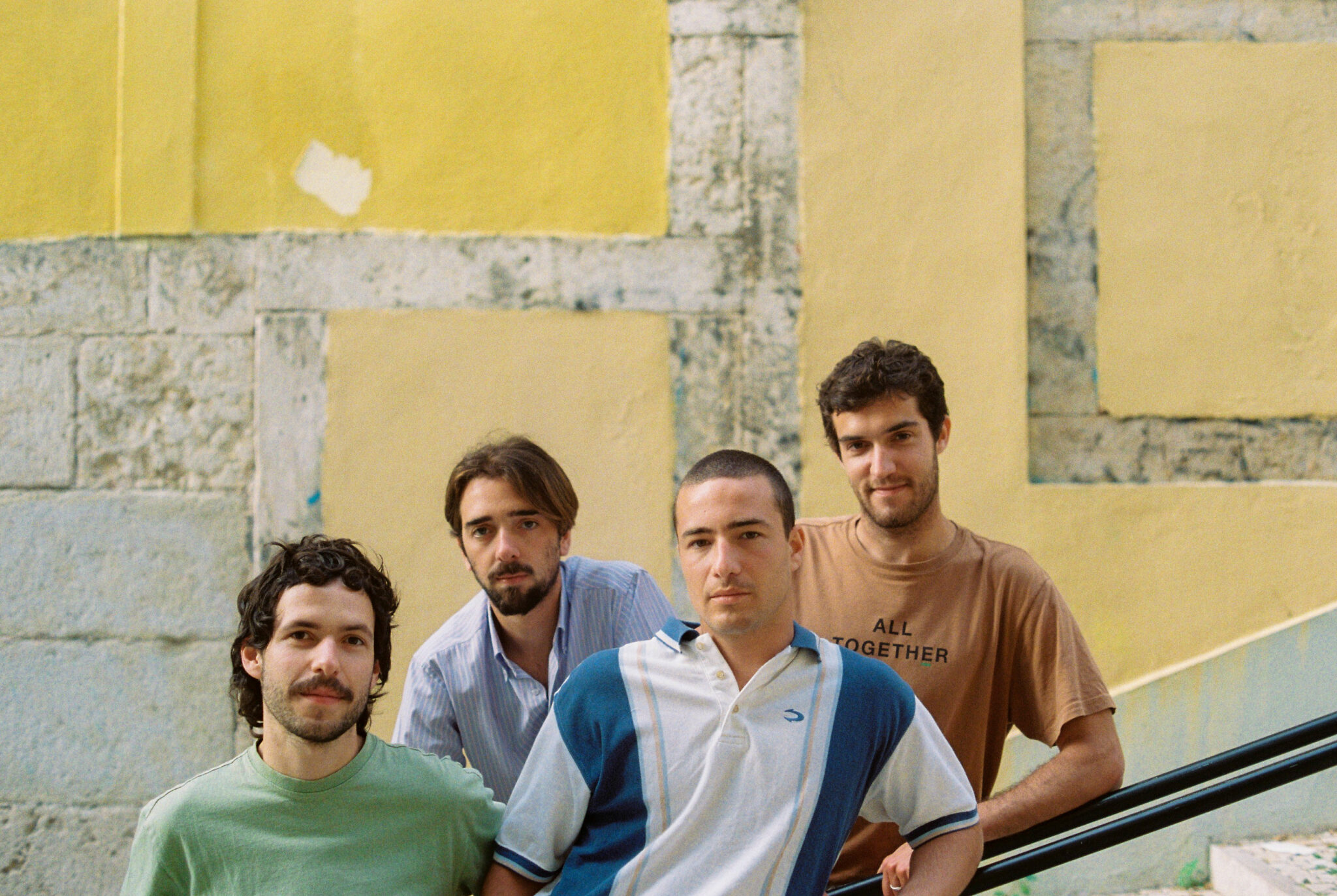
Timequake means “a disturbance in the flow of time”. There’s a nostalgic, almost unhappy feel to your music. Does it bother you that time passes too fast, or do you feel stopped in time?
João Girbal: Each one will have a different answer. For example, if we talk to António Jordão, it bothers him that time passes too quickly because he always has an urgency to live. Even because, for example, he goes to bed and is afraid to go to bed, he doesn’t want to go to sleep, he wishes that he didn’t have to sleep, so that he could continue living.
I believe that time passes too quickly and looking back to the period when the band started, it seems that everything passed very quickly and that certain memories of that time got erased.
Zé Salgado: COVID itself happened around the time the songs were composed and written. In a way, it was a general Timequake for the world. Suddenly you don’t know what is happening, how time is flowing, and how you are evolving because you can’t do the things you could do before. Timequake is also the title of a novel by Kurt Vonnegut, which tells the story of a character who suddenly goes back 20 years, having to live his life exactly as he lived it, without being able to change his destiny.
Your song “Lisboa Continua” was written by your friend Guilherme Afonso. How did this collaboration happen?
António Jordão: It was always normal to get together at the house of one of us and stay there for three or four days making music. In one of those retreats, in Zé’s house, at an early stage when we were making the first songs, when there was no direction at all, Gui came with us and wrote some texts and helped us with the lyrics. One day, it was already 5 or 6 in the morning, and I wanted to go to sleep, and he asked me: “Please António, just try to do something with these lyrics”. I tried for a while and nothing was coming out, but he kept urging me to keep trying. So, I kind of invented a part and started singing over it. When I looked over, Gui was crying. I got all happy and we watched the sunrise. The next day I showed the song to these guys and they hated it. I was soiled.
“Lisboa Continua” by Manteau.
Shot by João Salgado and Pablo Garrido.
Your next EP, Farsa, is almost out. “Passing through, passing through. Sometimes happy, sometimes blue. Glad that I ran into you”. Would you say these verses define Farsa?
Janito: In the general sense of all of us, they define everything.
António Jordão: I think Farsa comes from us feeling that we still haven’t got to our concept or that we are still looking for the Manteau sound, and for the right direction. We are in a phase of experimentation and out of that, very different things come out. So, the name Farsa was left. Also, Janito had a puppet at home, which helped consolidate our approach to the EP.
Zé Salgado: We don’t know what our sound is, but we’re assuming that this is a farce. We’re putting on this mask that we’re now a band that makes a Dub, a song like “The March Of The Silver King”, or a “Funny Hand” that has raw and emotional lyrics. We’re putting on different masks, which are not fake, they’re farces, but they’re true to who we are and the music we’re making.
The songs “Cepa Torta” and “Funny Hand” made me think about growing up and the difficulties that are associated with that. Zé, in “Funny Hand”, you end the song with what sounds to me like a scream of despair. Have you felt the pains of growing up in your skin?
Zé Salgado: “Funny Hand” came out of a text I wrote last year. There was a night at Cosmos, which was Tertúlia night, where people go there and read texts. I went there to read that piece of writing to get out of my comfort zone and expose myself. I liked reading it, people liked it, and it’s a text in which I’m bleeding and I know it. And that’s why you feel it. It went well and it made sense to me to move that text to the microphone. That’s how “Funny Hand” came about.
João Girbal: “Cepa Torta” also has a lot to do with that. It was a very difficult song to build because to make things more interesting, we started playing it at a tempo that wasn’t natural for us, and it required a bit of technical effort to be able to play the song well. At the time of constructing the lyrics, I remember we were talking to Bicudo and we started thinking about concepts, or ideas that made sense to us. One thing in common, even for Bicudo, was the need we have to be guided by some idea that moves us, something bigger than us, that makes us do things and stop the inertia. Because of this conversation, Bicudo remembered the phrase: “noutro dia, de outra forma, a mesma idea”.
Zé would you like to elaborate on what you mean when you say: “the cards we are given in order to live, and which keep us from flying”?
Zé Salgado: That has to do with “Funny Hand”. Funny Hand has the connotation of a card game hand. It’s what we have. We are born with the body, the brain, and the family that we have and sometimes we can feel limited and condemned by what we are given. When I wrote that text I felt that. I have these problems, I live here, and I have to deal with them. And I felt that these easily generated ideas made me believe that it was “the cards that were given to me to live” that didn’t allow me to fly and reach my dreams.
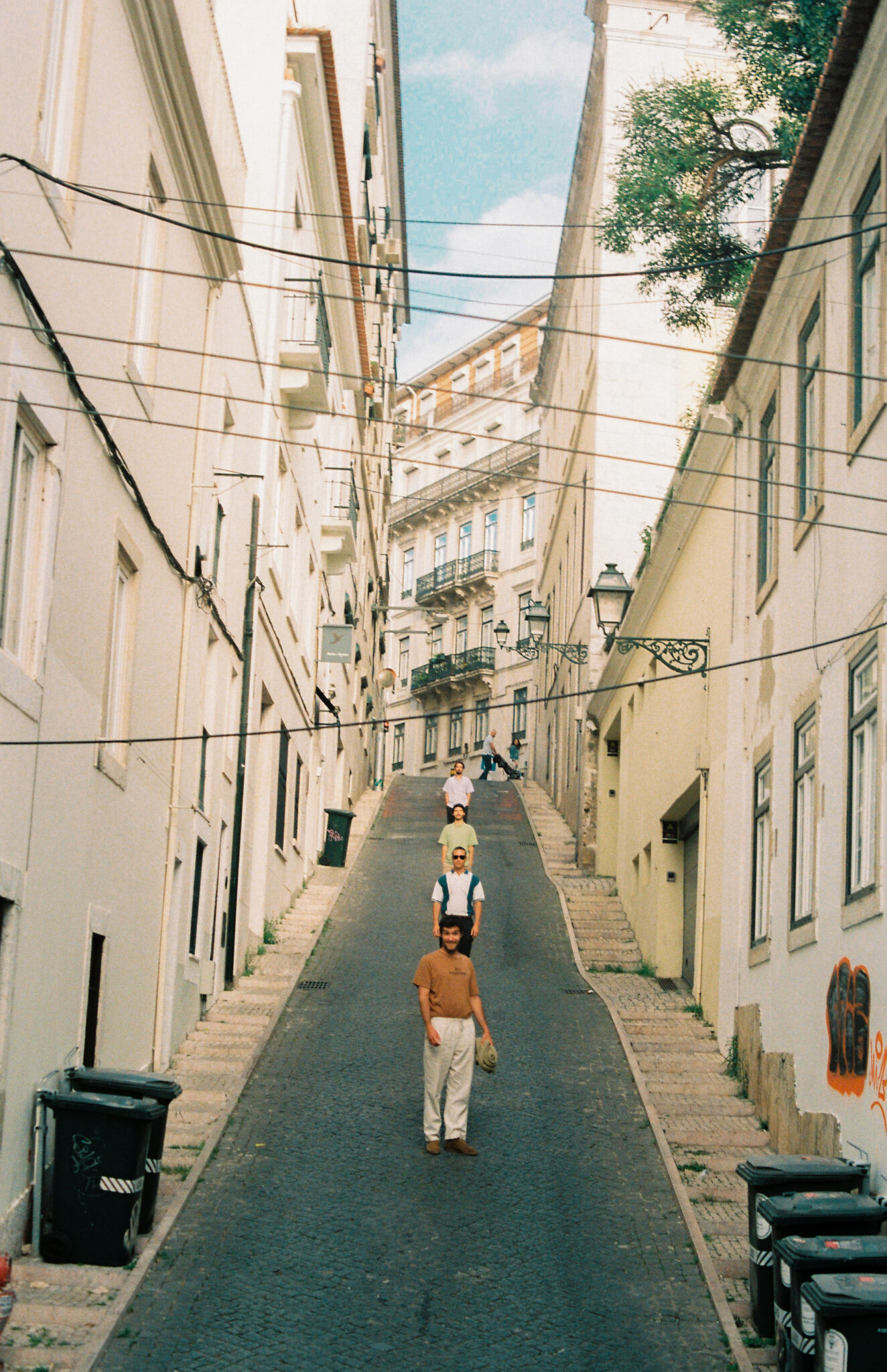
How did João Fragoso orchestrate and unblock your creative processes during the creation of Farsa ?
Janito: I think João is a much more experienced musician than all of us. He knows all of us very well. On the other hand, he is a bit more outside the band than Bicudo, so he has a more aerial perspective. Also, he always can see the light at the end of the tunnel, especially when we’re burying ourselves in a hole. He tells us: “No guys, just go that way” and he manages to simplify everything. Most of the time, Fragoso is right. There’s a blind trust, which in one way or another leads everyone in the same direction.
António Jordão: João accompanied us on a retreat and in the recordings of Farsa. He made a Swiss army knife of creativity on a blank board, which he filled with ideas. He helps you to find your voice and to find ways of being creative, without going to the technical side. How do you unlock processes and find your sound, without studying arpeggios, scales, and more technical content. We think that sometimes we can’t do certain songs because of a lack of technique and that this is an impediment, and he shows us the opposite.
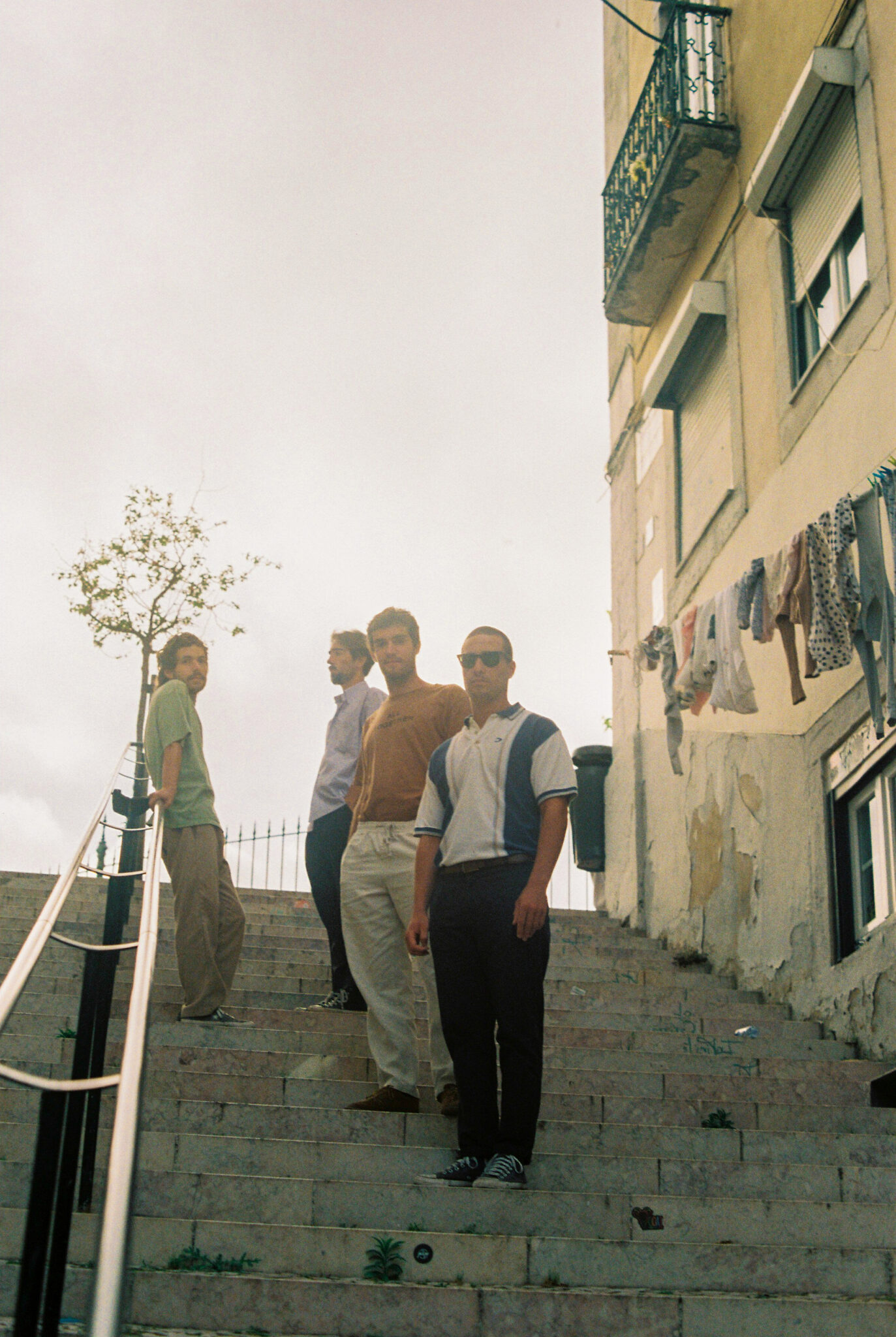
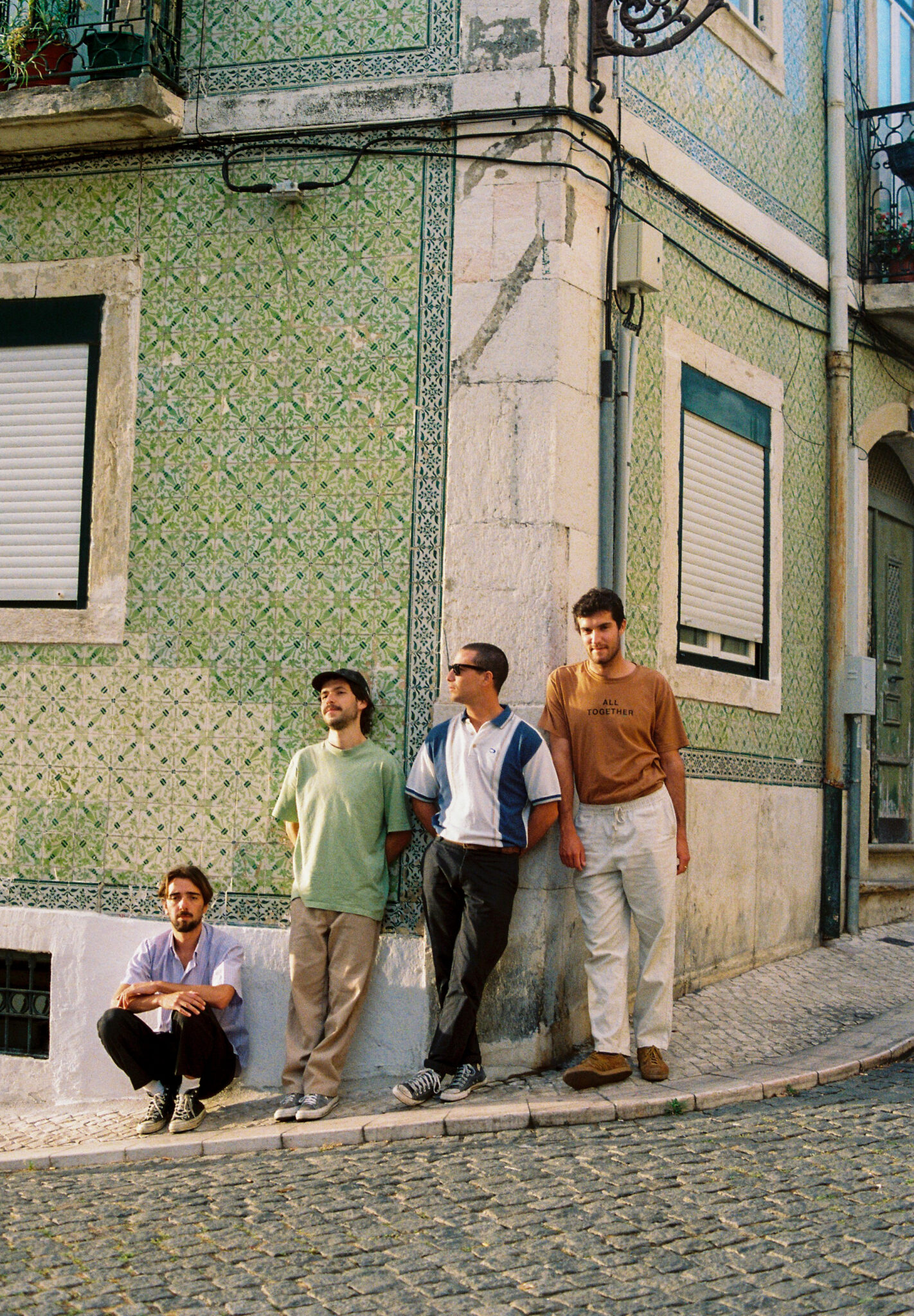
How did your song “The March Of The Silver King” got created?
Zé Salgado: It’s the song that fits less with the others, it’s the “wild card”. In concerts, we always feel that it’s a shock for the audience. For us, it made perfect sense to end the EP with the “ace of spades”. It’s a fantastic story that was written by a great friend of mine from Switzerland, Gwyn William Glasser, who performed with us at Super Bock em Stock last year. He is a very theatrical person who has always loved all things fantasy literature.
Janito: At Super Bock we invited Gwyn, Bicudo, and Fragoso, to come on stage with us, who are people who had some impact on Manteau, and now we are realizing that Gwyn had more impact than just writing those lyrics. He has a theatre tradition and has studied dramatic expression, where he learned exercises that actors do, which have to do with relaxing your body, feeling your presence and that of others, being connected, and inhabiting your body and not just your head. We did that before the concert, it was really cool, and it worked. Whenever we get the chance, we’ve been doing that.

“The March of the Silver King” by Manteau, performed with Gwyn William Glasser.
Shot by João Salgado.

I’m going to read you two verses of yours and I’m going to ask you each to say the first word that comes to your mind when you think of these verses:
“It is almost time to go. No one knows. And no one cares what we are doing over here.”
António Jordão: I’m going to say Brazil, that’s where the inspiration came from. Brazilian music.
Janito: Process.
Zé Salgado: Comfort.
Girbal: Urgency.
“Pensamento não está isento e faz reflexo. Há algo em falta e também há algo em excesso”.
Girbal: Feedback.
Zé Salgado: Insomnia.
Janito: Intrusive.
António Jordão: Search. Always looking for something and never finding it.
I’m going to read you two verses of yours and I’m going to ask you each to say the first word that comes to your mind when you think of these verses:
“It is almost time to go. No one knows. And no one cares what we are doing over here.”
António Jordão: I’m going to say Brazil, that’s where the inspiration came from. Brazilian music.
Janito: Process.
Zé Salgado: Comfort.
Girbal: Urgency.
“Pensamento não está isento e faz reflexo. Há algo em falta e também há algo em excesso”.
Girbal: Feedback.
Zé Salgado: Insomnia.
Janito: Intrusive.
António Jordão: Search. Always looking for something and never finding it.

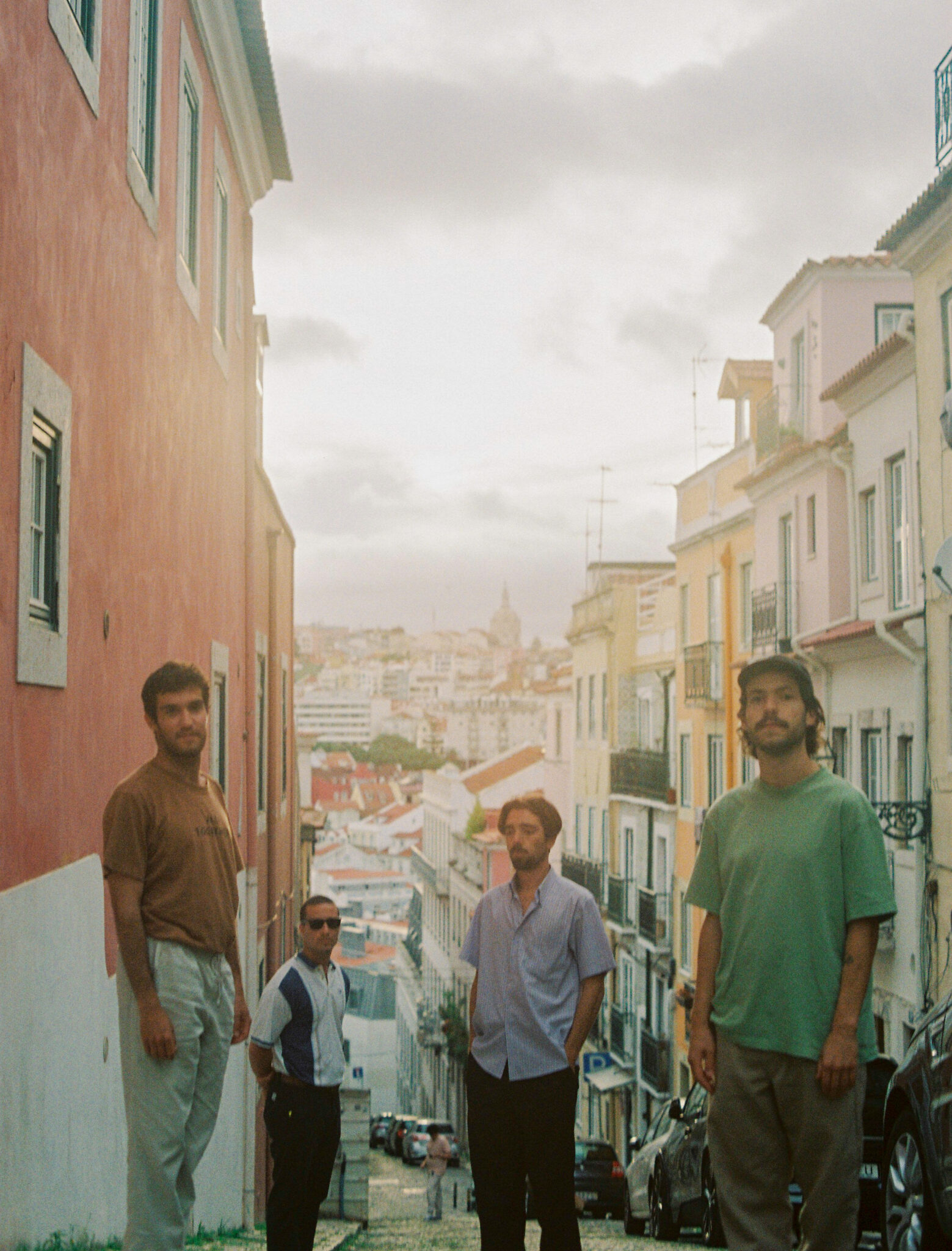
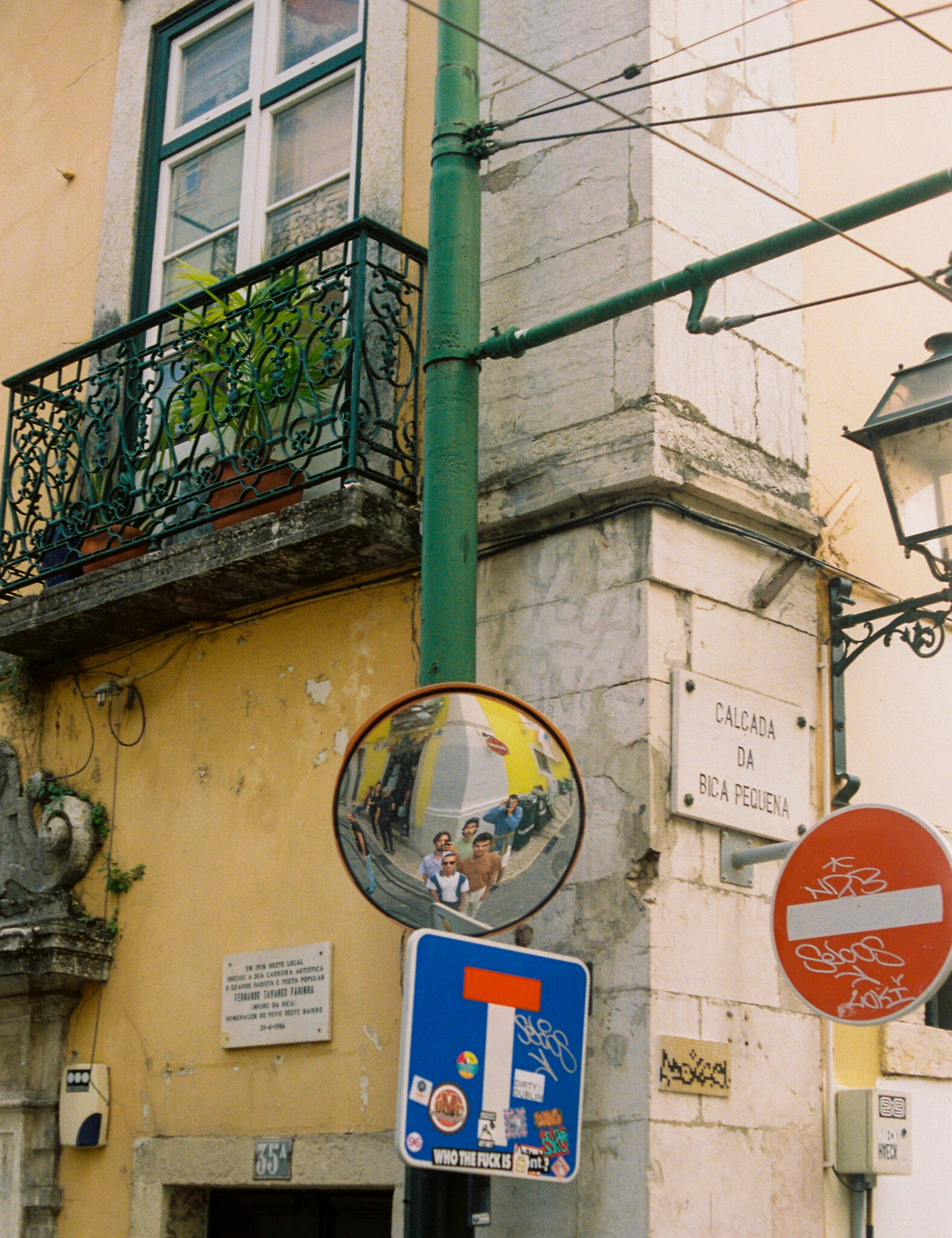
What importance do the Santa Cruz retreats have for you and the band?
António Jordão: When we started taking music more seriously, we started doing retreats to compose, play and rest. I asked my grandfather if we could use his house in Santa Cruz, and he always encouraged us to go there to make music and have fun.
The retreat is always important for us. Coming to the studio to rehearse for three hours doesn’t work. We have to have space, time, and availability for things to start to get going and for them to make sense.
Janito: We’ve realized that not much is born in the studio. I don’t know if it’s the space if it’s the lack of light, I don’t know what it is. Definitely being three or more days all together in the same house allows for a more fruitful creation. Creativity works well when there are some limitations. The fact that we have three or four days, in a certain space, with a certain goal, facilitates creation. I feel that sometimes you have to enter into these moments deeply and getting into that spirit takes time. It’s hard to work all day like Girbal does from 9 am to 5 pm and then come to rehearse and compose a masterpiece.
To finish, how important is surfing for your daily life and balance?
Janito: For me, it is just an ambition because I have never surfed, but they are making me want to try it.
Zé Salgado: Surfing for me takes on the various roles that we talked about regarding the “noutro dia, de outra forma, a mesma ideia” verse. Surfing can fill holes. One day I can be anxious, I don’t know what to do, I’m down, I go surfing and I come out of the water in a much better mood. It can be surfing with friends, which has a social component, but it can also be more serious and challenging surfing, with big and heavier waves.
João Girbal: Whenever I go surfing, regardless of whether I’m having the shittiest day ever, I know that I’m going to leave the sea happier. Even if it’s shitty surfing. When I go out to sea, I come back much more relieved. I don’t remember thinking about other problems while I’m surfing. It’s a Zen hour. For me, it relieves me a lot at certain times in my life.
António Jordão: Surfing is an art and transmits a lot of a person’s personality. It’s easy to see this when you already have some experience. You can kind of study a person by the way he surfs. What surfing gives us is a common “language”. The core of our group comes from surfing, so there is a ‘language’ that everybody knows how to speak, and the characteristics and values of the people are there. It’s easy to communicate.
Another thing I think surfing has, like music, is that you can come out of it angry and humiliated or can feel like the best surfer in the world, like you sometimes feel like the best musician on the planet. I think that being exposed to that spectrum of experiences, which both music and surfing provide, is good. Because you feel things that you might not feel if you didn’t do them. It takes you to extremes and forces you to solve uncomfortable situations that you have to deal with. I’m always looking to be present, which is something I struggle with. And in surfing, you end up being present because it’s compulsory in certain situations. When you’re surfing, you’re not thinking, you’re simply present, without worrying or rambling, and it’s cool to be able to achieve that every now and then.
